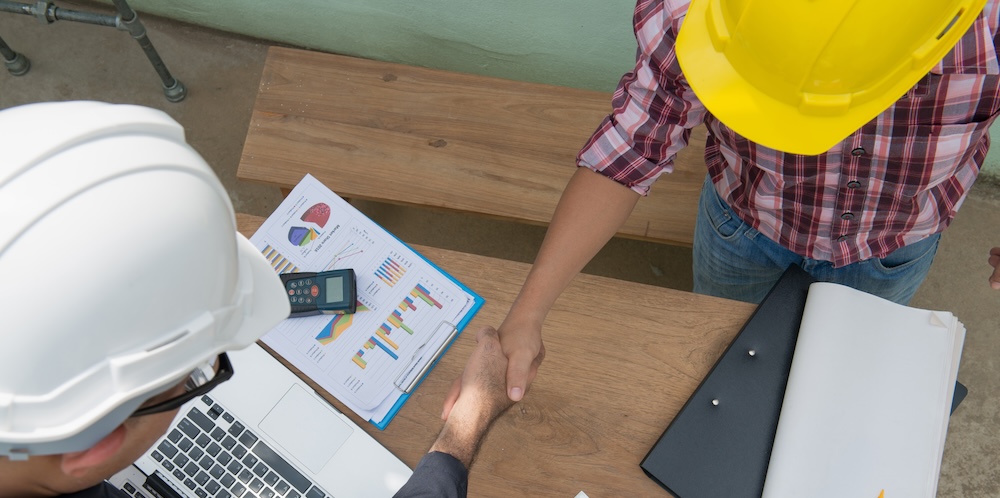— 6 min read
How Pre-Bid Meetings Impact Construction Bidding
Last Updated Sep 19, 2024
Last Updated Sep 19, 2024

Deciding to bid on construction jobs is not a decision contractors take lightly. There are many factors to consider in what constitutes the "right" project. Location, project type, available resources and other project details each play a role in deciding whether to get involved.
Pre-bid meetings, also known as pre-bid conferences, are a great way for contractors who are considering bidding to get more than just a better understanding of the project site, scope and owner goals and get to know the faces of those they are bidding to work for.
This article will go over the general format for pre-bid meetings and some things contractors can do to prepare to have the most helpful meeting possible.
Table of contents
Understanding Pre-bid Meetings
Accurate bidding can make or break a construction project. Contractors who bid too high are likely to lose the chance to work on the project, while contractors who bid too low put themselves at risk for losing money on the work or failing to complete it at all. Pre-bid meetings allow contractors to see the site, ask questions about the project and generally get a better grasp on what the project will involve to help prepare a more accurate bid.
Pre-bid meetings are information sessions hosted by a project owner or architect, with the goal of allowing contractors to get a better understanding of the proposed work and give all potential bidders the same information. The meeting takes place just a few days or a week after the contractor receives the project documents and a few weeks before bids are due.
Invitations to pre-bid meetings are often included with the bid documents, and all qualified bidders are expected to attend. In some cases, contractors who don’t attend the pre-bid meeting may even be disqualified from the bidding process. Some construction firms will bring their larger specialty contractors to the meeting as well, so that they can better grasp the work needed and provide more accurate estimates of their costs.
During the pre-bid meeting, contractors can ask questions, tour the site and gather more information about the project before they submit a bid. After the meeting, the owner will distribute meeting minutes to all attendees.
The Benefits of a Pre-bid Conference
A pre-bid meeting prepares a contracting team for a quality bid proposal, which then sets the project up for success by being accurate with numbers. Good project managers take the plan and improve on the numbers and see it through, but ultimately the estimation has to be right or the project loses its chance of success.
On its face, the pre-bid meeting is a great place to work out any confusion about the bid documents and get clarity on the owner’s intentions for the new project. On closer inspection, it becomes clear that one of the key benefits to attendance is hearing competing contractor’s questions and concerns about the project, including things that other bidders may not have considered.
In some cases, especially in the case of a renovation or addition to an existing building, bidders take photos and videos of the site so that they can remember and go over all of the details of the site as they’re putting a bid together.
The Challenges of Pre-bid Meetings
While pre-bid meetings can offer a valuable resource for a contracting team to gather information on a prospective project, they also cost time and money.
It takes time to work through project documents and prepare for a meeting with the owner and design team. The contracting team may go through all this heavy lifting, attend the pre-bid meeting and craft a top-notch bid — only to lose out on the project to another contractor.
There’s no doubt that a pre-bid conference represents the cost of doing business. However, accurate estimates are so critical to the success and profit margin of a project, that contractors must spend the time to attend. If nothing else, the contractor can learn from losing bids by gaining knowledge about the project and competing contractors through the meeting.
Stay updated on what’s happening in construction.
Subscribe to Blueprint, Procore’s free construction newsletter, to get content from industry experts delivered straight to your inbox.

Getting the Most Out of a Pre-bid Meeting
The pre-bid meeting represents a golden opportunity to get as much information as possible about the project, so be prepared to ask informed questions.
Read the project documents.
Heading into a meeting, it’s important for contracting teams to be as familiar as possible with the project documents, like any plans, specifications and information on the invitation to bid. Try to anticipate which competing contractors may have been invited to come,and what they may ask at the meeting. Finally, prepare a list of questions that come up from reading the documents.
Send somebody knowledgeable.
Some time-strapped contractors send just the first available person to attend a pre-bid meeting — an intern or back office worker who happens to have the time. By doing so, they miss the chance to capitalize on the benefits the meeting can offer.
Don’t look at the pre-bid meeting as a way to tick a box in order to maintain eligibility to bid. The conference is an opportunity to foresee any existing conditions and design features that may cost more time or money during the project. Make the best use of the time spent by sending a person or team that has knowledge and experience enough to get value from it.
Notice key details.
With experience, contractors get a better sense of elements that will impact the cost of building a project. Even if the site is a blank lot waiting for a new building, there’s a lot that can be learned by looking around the project location.
Here are some things to look for at a pre-bid meeting:
- Distance from office
- Site conditions
- Site access
- Groundwater
- Traffic considerations
- Adjacent structures
- Possible contamination
- Water, electricity and telephone service
- Obstructions
- Parking and storage
- Debris disposal
Any of these characteristics of a construction project site can lead to additional costs, labor requirements and time considerations.
In some cases, attendance at a pre-bid meeting may lead a contractor to decide not to bid on a project at all. This might happen if the conditions seemed a little too unfavorable, if the project was really out of the contractor’s specific knowledge base or if there were too many competing contractors at the meeting.
If the project looks like it’s not a good fit or not likely to be won, the contractor may ultimately decide not to spend the time and effort on creating a bid.
Maximizing Bid Potential
Pre-bid meetings are an important part of the bidding process in construction, providing contractors with essential information that can make or break their bids and set them up for better understanding of construction.
Contractors who prepare for and attend pre-bid meetings with active curiosity stand to gain a better understanding of the project site, the possible scope and the owner's goals. They also benefit from hearing the questions and concerns of competing contractors. Despite the time and cost involved, the value of accurate estimation and the opportunity to better understand the project's nuances make pre-bid meetings an important step in setting up a successful construction project.
Was this article helpful?
Thank you for your submission.
100%
0%
You voted that this article was . Was this a mistake? If so, change your vote here.
Scroll less, learn more about construction.
Subscribe to The Blueprint, Procore’s construction newsletter, to get content from industry experts delivered straight to your inbox.
By clicking this button, you agree to our Privacy Notice and Terms of Service.
Categories:
Tags:
Written by
Ben Ashburn
20 articles
Ben Ashburn is a Senior Construction Education Trainer at Procore. After a successful career as a construction estimator — working his way up from estimating manager to senior estimator — Ben has spent the most recent part of his career in construction sharing his skills with other as a construction educator. Ben has an extensive background in construction education: He has been an assistant professor in the Department of Construction Science at Texas A&M, and lectured about estimating, scheduling, management, and other related construction topics at Murray State University. He has been a construction training and learning development partner with Procore since 2019.
View profileKristen Frisa
67 articles
Kristen Frisa is a contributing writer for Procore. She also contributes to a variety of industry publications as a freelance writer focused on finance and construction technology. Kristen holds a Bachelor of Arts in Philosophy and History from Western University, with a post-graduate certificate in journalism from Sheridan College. She lives in Ontario, Canada.
View profileExplore more helpful resources

Winning Bids with BIM: Marketing the Benefits to Owners
Creating a 3D model of a construction project is becoming more common but, that doesn’t mean that all projects leverage BIM – or, that all companies are using BIM in the...

Mastering Construction Bid Templates to Simplify the Process and Win More Work
Every construction project is different. Different set of challenges, timelines, key players, etc. Because every project is different, what project owners need to know from a bid will differ based...

How To Improve Your Bid-Hit Ratio: 5 Strategies To Deploy
The bidding process is a necessary part of the construction game for any general or specialty contractor. Without bidding jobs and getting awarded contracts, the company doesn’t have a way...

The Hidden Cost of Construction Bid Shopping
On any construction project, a general contractor (GC) has an overarching goal: complete the required work with a profit margin. Because very few GCs self-perform a project in its entirety,...